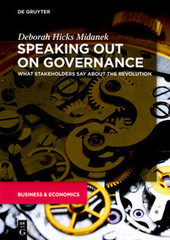 Your new post is loading...
A new WSJ op-ed: “‘Stakeholder’ Capitalism’ Seems Mostly for Show” (Lucian Bebchuk and Roberto Tallarita, Harvard Law School Program on Corporate Governance) posits that the corporate CEOs that signed onto the Business Roundtable’s (BRT) updated Statement of Purpose of a Corporation last year appear to have done so primarily to generate positive PR rather than to reflect real change in how their companies operate based on the fact that few signatory CEOs sought or obtained board approval or ratification. The conclusion rests on the theory that if CEOs believed that signing onto the updated statement was an “important corporate decision,” they would not have signed on without their board’s approval as a matter of good corporate governance. The assertion that few signatory CEOs sought or obtained board approval or ratification is based on responses to the authors’ inquiries from 48 companies, or approximately 27% of all CEO signatories, and the authors’ extrapolated expectation that the balance of companies that did not respond to their inquiry would have responded similarly.*
In August 2019, the Business Roundtable (BRT) issued a statement on the purpose of the corporation in which it reversed a longstanding position. Since 1978, the BRT has periodically issued statements on Principles of Corporate Governance, which purport to summarize law and best practice in this area. Since 1997, all versions of those statements had embraced the view that corporations exist primarily to serve their shareholders. In contrast, the 2019 version contains a much broader conception of corporate purpose, which posits that corporations should “commit to deliver[ing] value to all of” the corporation’s stakeholders. Obviously, the BRT cannot unilaterally change the law. As this article explains, the law of corporate purpose remains that directors have an obligation to put shareholder interests ahead of those of other stakeholders and maximize profits for those shareholders. What people do matters more than what they say. To date, the evidence is most BRT members remain committed to shareholder value maximization, despite their recent rhetoric to the contrary. This should not be surprising. The incentive structure faced by directors and managers still skews in favor of shareholders. Why then did the BRT shift position? This article suggests two possibilities. First, the members may be engaged in puffery intended to attract certain stakeholders for the long-term benefit of the shareholders. Specifically, they may be looking to lower the company’s cost of labor by responding to perceived shifts in labor, lower the cost of capital by attracting certain investors, and increase sales by responding to perceived shifts in consumer market sentiment. They may also be trying to fend off regulation by progressive politicians. Second, some BRT members may crave a return to the days of imperial CEOS.
The evolution of the modern corporation is the fascinating story of a series of self-serving legal and societal mutations over hundreds of years, which have morphed the original concept and endowed corporations with freedom of activity, rights, and limitations on liability that would shock their original “inventors”. As we all know, for many years most corporations were established by way of an exceptional “charter” by a sovereign, granted only in specific cases where: (a) large amounts of capital were needed (b) to conduct investments and activities that served public or national interests and had good profit potential, but (c) where the risks were so large that few parties would invest if their risk were not shared with many others and/or limited to the amount of money they invested. In the 1600s and 1700s, the activities that sovereign nations felt met those requirements were the exploration of foreign lands on the other side of the globe, the creation and administration of colonies there, and conducting lucrative trade on long (and dangerous) sea routes to and from those colonies. Thus, the most well-known early corporations include organizations such as the British East India Company (the original “too-big-to-fail company), The Dutch East India Company, the Hudson’s Bay Company, and companies to construct the Erie Canal.
Speaking Out on Governance presents a range of viewpoints concerning the role of today’s corporation and its board of directors. The author engages in candid discussion with subject matter experts including boardmembers, corporate attorneys, academics, institutional investors, regulators, and activists. These interviews of leading authorities in the corporate governance arena provide the reader with unique insight into the vitally important but often misunderstood role played by the board. Deborah Hicks Midanek discusses perspectives regarding what directors of businesses actually do and should do; the true motivations and concerns of the various parties seeking to influence corporate behavior; legal issues surrounding the board; and the key similarities and differences of opinion that may help improve effectiveness of all parties and increase board and director effectiveness. This book is essential reading for corporate directors and would-be directors, senior managers, attorneys, consultants and anyone interested in what drives organizational behavior.
The focus on human capital and talent in corporate governance is intensifying, as more stakeholders—led by large institutional investors—seek to understand how companies are integrating human capital considerations into the overarching strategy to create long-term value. After all, a company’s intangible assets, which include human capital and culture, are now estimated to comprise a significant portion of a company’s market value. Many influential groups, including the Global Reporting Initiative, the Embankment Project for Inclusive Capitalism, the Business Roundtable and the Sustainability Accounting Standards Board (SASB), have identified human capital as a key driver of long-term value. Recent developments reflect a clear and growing market appetite to understand how companies are managing and measuring human capital. This includes influential investors making human capital an engagement priority with directors, as well as comment letters from various stakeholders to the U.S. Securities and Exchange Commission supporting greater human capital disclosure and asserting the importance of human capital management in assessing the potential value and performance of a company over the long term.
Enduring and sustainable corporate success hinges on trust. But trust is hard won and easily lost. This series of articles will explore the evolving “Trust Continuum” and how organizations can meet new expectations in the era of stakeholder capitalism [1]—not only of their shareholders and investors but all stakeholders—and build long-term trust based on purposeful, transparent and consistent actions and interactions. We will examine global governance and the rule of law, the changing face of leadership, ethical technology and more in this series—uncovering the strategies that will enable corporations to become and remain trusted organizations. The purpose of business in society has not changed—the creation of wealth and job opportunities and making things or providing services people need. What is changing is the “how”.
98,5 fm - Attendez-vous à plus ! nouvelles, actualité, analyses, météo, finance, monde, circulation, radio e
L’IGOPP lançait lundi soir On Becoming an “Activist” Board… In the Age of Activist Shareholders. Ce livre, cosigné par Yvan Allaire et deux autres auteurs, aborde les limites de la gouvernance fiduciaire actuelle et tire des leçons d’événements survenus dans des sociétés publiques comme le Canadien Pacifique, SNC-Lavalin ou Pepsi.
Les sociétés d’État québécoises jouent un rôle économique et fiscal de grande importance. Les 46 sociétés visées par cette étude affichent des revenus collectifs de 63 milliards $ et emploient quelque 65 000 personnes. Les gouvernements, surtout celui du Québec, leur accordent des subventions annuelles qui, en 2016, totalisent plus de 4,3 milliards $ alors que d’autres sociétés versent au gouvernement du Québec quelque 4,6 milliards $ en dividendes.
Le président du Mouvement Desjardins, Guy Cormier, défend la transparence de la coopérative. En marge de l'assemblée générale annuelle, il soutient que l'institution financière partage ses états financiers et ses orientations quant aux ristournes dans les meilleurs délais possible.
|
Directors of most for-profit U.S. corporations have long considered the corporation’s relationships with customers, employees, suppliers and the communities in which they operate—sometimes referred to as “stakeholders” —in the course of overseeing the building, operating and growing of the corporations’ businesses. In more recent years, the concepts of “stakeholders” and “stakeholder interests” have greatly expanded, with the interests generally falling under the umbrella of environmental, social and governance (ESG) matters. [...] This article, through stating a series of guiding principles, attempts to “cut through it all” like the Gordian Knot, bring clarity to the discussion and provide real-world guidance for director decision-making.
Principle 1: Directors’ statutory mandate and fiduciary duties contemplate consideration of long-term value.
Principle 2: Stakeholders interests may support long-term value.
Principle 3: Many proponents of stakeholder interests believe they support long-term value.
Principle 4: Stakeholder interests that support long-term value align with stockholder interests.
Principle 5: Boards should exercise oversight with respect to stockholder-aligned interests.
Principle 6: Directors should focus on the relevance of stockholder-aligned interests.
Principle 7: Boards should carefully manage processes relating to stockholder-aligned interests.
Principle 8: Pursuit of stockholder-aligned interests is subject to business constraints.
Principle 9: Business judgment rule protection for directors is achievable.
Scholars, practitioners and policymakers continue to debate what constitutes “good” corporate governance. Investors threaten to vote against directors of issuers with defective governance practices while, at the same time, call for regulators to ban particularly controversial practices such as fee-shifting bylaws and dual class voting structures. Although empirical studies have failed to develop conclusive evidence linking specific governance provisions to firm value, the debate has become increasingly heated and political. In Synthetic Governance, we provide a possible solution to the debate. As we explain, the rise of index investing offers a low-cost market-based tool by which asset managers can give investors the opportunity to vote with their feet by selecting a rules-based investment strategy that screens portfolio companies according to specified governance criteria. Investors with particular corporate governance preferences could, by selecting a bespoke governance index, and mechanism, invest according to those preferences. At the same time, governance-based indexes can provide valuable data on the relationship between corporate governance and firm value.
As of this writing, the US COVID-19 pandemic impacts include 100,000 dead and almost 40 million newly unemployed. The reopening process is anticipated to yield a “roller coaster” recovery in which businesses will restart and then shut down again in response to workforce and regional outbreaks. Although all members of society are affected by this extended crisis, the pain is unequally distributed, with front-line workers and people of color among the hardest hit. The pandemic is testing all of us, and it is also a litmus test for the 2019 pledge of 183 corporate CEOs to operate their businesses in the interests of employees, consumers, suppliers, and communities, as well as shareholders. [...] If stakeholder capitalism is to be made real, shouldn’t there be corresponding rules and concepts of stakeholder governance? Isn’t there a need for a coherent set of legal and operational principles for implementation? How will the fiduciary duties of directors and executives change to reflect these new commitments?
Posts published by the Harvard Law School Forum on Corporate Governance have had considerable influence on the discourse and literature in the field of corporate governance, as measured by citations of Forum posts. Since the Forum was established in 2006, Forum posts have been cited more than 1400 times, and such citations have appeared in more than 800 articles. [...] Established in 2006 by Professor Lucian Bebchuk and the Harvard Law School Program on Corporate Governance, the Forum has become the leading online resource and the central outlet for the exchange of ideas and debate in the field of corporate governance. In an article about the Forum that was featured in the Harvard Law Bulletin a few years ago, former Chief Justice Leo Strine observed that “[i]t is amazing to see the [Forum] become required reading among the intelligentsia … of corporate governance.” The success of the Forum has been made possible by the contribution of numerous authors, as well as by the engagement of the Forum’s ever-growing readership. As we celebrate another record-breaking year, we are deeply grateful for the support of our contributors and readers and look forward to continued fruitful engagement!
Should firms target short-term objectives or long-term performance? The question of the optimal horizon of corporate policies has received considerable attention in recent years, with much of the discussion focusing on whether short-termism destroys value. The worry often expressed in this literature is that short-termism—induced, for example, by stock market pressure—may lead firms to invest too little (see Asker, Farre-Mensa, and Ljunqvist, 2015; Bernstein, 2015; Gutierrez and Philippon, 2017, for empirical evidence). Another line of argument recognizes, however, that while firms must invest in their future if they are to have one, they must also produce earnings today to pay for doing so. In line with this view, Giannetti and Yu (2018) find that firms with more short-term institutional investors suffer smaller drops in investment and have better long-term performance than similar firms following shocks that change an industry’s economic environment.
Research from FCLTGlobal and others confirms that long-term companies outperform on financial metrics, including revenues, profitability, and stock price, as well as non-financial ones like job creation and sustainability. As a recent study of large public companies in the USA found, from 2001-2014 long-term companies cumulatively grew their revenues 47% more on average as compared to their shorter-term peers, and with less volatility.
Vous trouverez, ci-dessous, un document partagé par Joanne Desjardins*, qui porte sur le rôle du CA dans l’établissement d’une solide culture organisationnelle. C’est certainement l’un des guides les plus utiles sur le sujet. Il s’agit d’une référence essentielle en matière de gouvernance. Je vous invite à lire le sommaire exécutif. Vos commentaires sont appréciés."
Le Québec compte un très grand nombre de sociétés d’État. Il est donc primordial de se soucier de leur bonne gestion, notamment de la gouvernance de leurs conseils d’administration. - À ce sujet, une étude fouillée vie
Yvan Allaire, président exécutif du conseil de l’Institut sur la gouvernance (IGOPP) vient de publier, en collaboration avec François Dauphin, un nouveau document de recherche intitulé « Nos sociétés d’État sont-elles bien gouvernées ? » lequel a fait l’objet d’une analyse succincte par le journaliste Gérald Fillion de la Société Radio-Canada. Selon l’IGOPP, « les contribuables s’attendent à ce que ces sociétés…
ANALYSE - Sur 46 sociétés d'État au Québec, seulement 23 obtiennent la note de passage en matière de gouvernance, selon une étude préparée par les chercheurs Yvan Allaire et François Dauphin.
La réforme Barrette n'a pas changé la donne, mais a simplement mené à la création de nouvelles entités administratives sans réelle ligne de responsabilité claire.
|
 Your new post is loading...
Your new post is loading...
















